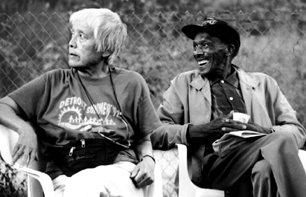I will be the first to admit that there is a relationship with
colonialism and the development of modern languages in the
third world. Languages were standardized which is a nice way
of saying dialects were destroyed. There are several ways to
destroy dialects: one way is to exterminate the people who speak
the given dialect and another way is to privilege those who are
to become the standard speakers of a given dialect. This will
give power and authority and force all other dialects to
learn at least the standard version of language. It is a horrible
feeling to know that on one hand that this is part of the development
of modern languages. While being aware of this legacy and also
being an immigrant who has a weak grasp on Urdu
(my native language) I also find myself yearning to master it for a
variety of reasons.
While I cannot do anything about the creation of languages
and am left dealing with the legacies of colonialism and my
immigrant status, I feel the importance of knowing my
native language. Especially living in the U.S. where English
is the way to communicate, learning Urdu provides me
with a way to connect back to my own roots. It is even
more important as I do this in the context of graduate school
where many non-South Asians are in my department. It is a
way to take back my own nation's history and connect with
different traditions and histories that I did not appreciate
when I was younger.
It is very difficult for me to describe exactly what I feel. I have
often found myself walking to the bus or to the library thinking about
how I feel when I hear songs in Urdu, poetry in Urdu, and especially
learn about the past radical movements in South Asia. I see a
connection between language, classes, nations, movements, and more. It
is not all worked out, but I hope that any future movement that
develops in the United States will be sensitive to the mother tongue
that many of us younger immigrants have forgotten.
I will not forget how much fun I made of my grandma, mom, or others
who could not speak English very well. I was definitely immature and
wanted to be an American kid. I did not appreciate my own people's
contributions to the concept of language in general. I could not see
the beauty in Urdu and only see the failings of Urdu speakers in how
they could not speak English...
All I can say to those folks who I have dissed and dismissed is my
apologies and hopefully my future work in the Asian-American community
will fix and absolve me of some of my own shortsightedness.
suraj
colonialism and the development of modern languages in the
third world. Languages were standardized which is a nice way
of saying dialects were destroyed. There are several ways to
destroy dialects: one way is to exterminate the people who speak
the given dialect and another way is to privilege those who are
to become the standard speakers of a given dialect. This will
give power and authority and force all other dialects to
learn at least the standard version of language. It is a horrible
feeling to know that on one hand that this is part of the development
of modern languages. While being aware of this legacy and also
being an immigrant who has a weak grasp on Urdu
(my native language) I also find myself yearning to master it for a
variety of reasons.
While I cannot do anything about the creation of languages
and am left dealing with the legacies of colonialism and my
immigrant status, I feel the importance of knowing my
native language. Especially living in the U.S. where English
is the way to communicate, learning Urdu provides me
with a way to connect back to my own roots. It is even
more important as I do this in the context of graduate school
where many non-South Asians are in my department. It is a
way to take back my own nation's history and connect with
different traditions and histories that I did not appreciate
when I was younger.
It is very difficult for me to describe exactly what I feel. I have
often found myself walking to the bus or to the library thinking about
how I feel when I hear songs in Urdu, poetry in Urdu, and especially
learn about the past radical movements in South Asia. I see a
connection between language, classes, nations, movements, and more. It
is not all worked out, but I hope that any future movement that
develops in the United States will be sensitive to the mother tongue
that many of us younger immigrants have forgotten.
I will not forget how much fun I made of my grandma, mom, or others
who could not speak English very well. I was definitely immature and
wanted to be an American kid. I did not appreciate my own people's
contributions to the concept of language in general. I could not see
the beauty in Urdu and only see the failings of Urdu speakers in how
they could not speak English...
All I can say to those folks who I have dissed and dismissed is my
apologies and hopefully my future work in the Asian-American community
will fix and absolve me of some of my own shortsightedness.
suraj






No comments:
Post a Comment